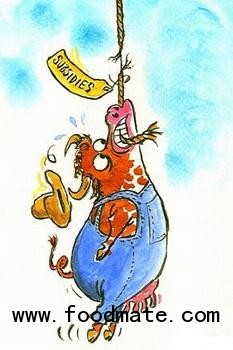 THE fiscal cliff may get all the attention along Pennsylvania Avenue these days but, almost unheeded, America’s agriculture is facing a cliff of its own. For the dairy business, it will arrive at the same time as the more famous version, at the end of the year.
THE fiscal cliff may get all the attention along Pennsylvania Avenue these days but, almost unheeded, America’s agriculture is facing a cliff of its own. For the dairy business, it will arrive at the same time as the more famous version, at the end of the year.Support for agriculture in America derives from farm bills that usually last several years at a time. Unfortunately, the last one expired on September 30th this year, with two different replacement versions, one in the House and one in the Senate, still unreconciled. Both aimed to cut farm spending a bit: over ten years, by $35 billion and $23 billion respectively. The bills also differ in the mechanisms they propose to support farmers. Southern peanut and rice farmers complain the Senate’s bill would make them lose out relative to Midwestern wheat and soya growers.
At the moment negotiations over the fiscal cliff are consuming all the political air. From soil conservation to price supports to trade, American farm policies are all on hold. The expiry of the latest bill means several conservation programmes have been frozen, as have export loan guarantees.
This year’s harvest is long in, so the effects so far have been muted. But if there is no farm bill by the start of the next agricultural year, the government’s price-support scheme will automatically revert to what it was in 1949. Most crops have until the spring or summer, but the deadline for milk and other dairy products comes at the end of December. Applying the old formulas today would require the federal government to buy up enough milk to establish a minimum wholesale price more than double its current level, and, later on, enough wheat to raise its price by 67%.
No one really expects Congress to plunge taxpayers into this “agriculture abyss”. When the previous farm bill was about to expire in 2007 the first of several temporary extensions was passed just days before the government would have had to intervene in the dairy market. Frank Lucas, the Republican chairman of the House agriculture committee, says that “reverting back to an antiquated system…is not responsible,” while Debbie Stabenow, the Democratic chairman of the Senate agriculture committee, is confident that a deal will be reached before the end of the year. But as with the rest of the fiscal cliff, the mere fact that both sides want a solution is no guarantee it will happen.







